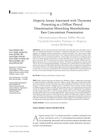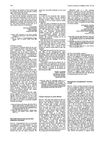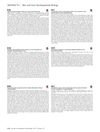 17 citations,
July 1995 in “International Journal of Dermatology”
17 citations,
July 1995 in “International Journal of Dermatology” Minoxidil helps prevent hair loss from chemotherapy in rats.
 16 citations,
March 2016 in “Clinical ophthalmology”
16 citations,
March 2016 in “Clinical ophthalmology” Bimatoprost is safe and improves eyelash growth in healthy kids but not in those with eyelash loss from chemotherapy or alopecia.
 14 citations,
July 2016 in “Environmental Toxicology and Pharmacology”
14 citations,
July 2016 in “Environmental Toxicology and Pharmacology” Cedrol may prevent hair loss caused by chemotherapy better than minoxidil.
 12 citations,
December 1987 in “Cancer Chemotherapy and Pharmacology”
12 citations,
December 1987 in “Cancer Chemotherapy and Pharmacology” Vitamin E in the diet might help protect against hair loss caused by the chemotherapy drug doxorubicin in rabbits.
 11 citations,
June 2012 in “Archives of Dermatological Research”
11 citations,
June 2012 in “Archives of Dermatological Research” L-cystine and vitamin B6 at high doses prevented hair loss in mice treated with a chemotherapy drug.
 10 citations,
July 2007 in “PubMed”
10 citations,
July 2007 in “PubMed” Chemotherapy causes hair loss in cancer patients by affecting both growing and resting hair.
7 citations,
August 2020 in “Plastic and reconstructive surgery. Global open” QR 678 and QR 678 Neo are safe and promote hair growth, potentially helping chemotherapy-induced hair loss.
 7 citations,
May 2014 in “Clinical practice”
7 citations,
May 2014 in “Clinical practice” Cooling the scalp may prevent hair loss from chemotherapy, hair often grows back after treatment, and nail issues usually improve after stopping the drug.
6 citations,
May 2002 in “British journal of dermatology/British journal of dermatology, Supplement” A rare skin condition linked to leukemia improved with chemotherapy.
5 citations,
July 2010 in “Archives of Internal Medicine” Prostaglandins may protect hair follicles during chemotherapy.
 5 citations,
June 2015 in “Journal of Investigative Dermatology”
5 citations,
June 2015 in “Journal of Investigative Dermatology” Feathers are useful for researching growth, regeneration, and the effects of treatments like chemotherapy on hair loss.
 4 citations,
January 1987 in “Journal of The American Academy of Dermatology”
4 citations,
January 1987 in “Journal of The American Academy of Dermatology” A man with both skin lesions and lung cancer improved quickly with chemotherapy, suggesting the skin condition might be a reaction to immune system injury.
4 citations,
February 2019 in “Breast Cancer Research and Treatment” DHL-HisZnNa may help reduce hair loss from chemotherapy, but more research is needed.
 3 citations,
April 2021 in “Biomolecules & Therapeutics”
3 citations,
April 2021 in “Biomolecules & Therapeutics” The protein ER71/ETV2 helps regrow hair after chemotherapy by improving the growth of new blood vessels.
 3 citations,
January 2018 in “Biomedical dermatology”
3 citations,
January 2018 in “Biomedical dermatology” Green tea extract helps prevent cell death and supports cell survival in hair cells exposed to a chemotherapy drug.
 1 citations,
May 2024 in “Türkiye klinikleri tıp bilimleri dergisi”
1 citations,
May 2024 in “Türkiye klinikleri tıp bilimleri dergisi” A rare case showed hair regrowth after chemotherapy for thymoma, suggesting a link between alopecia areata and thymoma.
 1 citations,
September 2005 in “Oncology times”
1 citations,
September 2005 in “Oncology times” Wearing a frozen glove during chemotherapy can reduce nail and skin problems but may not be comfortable for everyone.
 1 citations,
August 1995 in “Archives of Disease in Childhood”
1 citations,
August 1995 in “Archives of Disease in Childhood” Minoxidil helped a boy regrow his hair after intense chemotherapy for leukaemia.
 1 citations,
September 2023 in “Journal of Investigative Dermatology”
1 citations,
September 2023 in “Journal of Investigative Dermatology” Melatonin may protect hair follicle cells from damage caused by a chemotherapy drug.
1 citations,
November 2022 in “Journal of Investigative Dermatology” ALRN-6924 may prevent hair loss caused by chemotherapy.
 1 citations,
January 2017 in “Current Dermatology Reports”
1 citations,
January 2017 in “Current Dermatology Reports” Early baldness in men may indicate risks for obesity, metabolic syndrome, insulin resistance, and heart disease, similar to women with PCOS. Alopecia areata is often linked with autoimmune diseases and mental health issues. Certain hair disorders are due to genetic issues, and chemotherapy can cause hair loss through specific biological pathways. Iron deficiency's link to hair loss is still disputed.

YH0618 helps reduce chemotherapy-induced hair loss by targeting specific proteins and pathways.
 April 2023 in “The journal of investigative dermatology/Journal of investigative dermatology”
April 2023 in “The journal of investigative dermatology/Journal of investigative dermatology” Low-intensity ultrasound may protect hair follicles from damage caused by a common chemotherapy drug.
 January 2023 in “Cancer research, statistics, and treatment/Cancer research, statistics and treatment”
January 2023 in “Cancer research, statistics, and treatment/Cancer research, statistics and treatment” Vijaya successfully fought stage 2A breast cancer with surgery, chemotherapy, radiotherapy, and hormone therapy, while advocating for support groups.
 November 2021 in “CRC Press eBooks”
November 2021 in “CRC Press eBooks” Anagen effluvium is a reversible condition causing sudden hair loss, often due to chemotherapy or head radiation.
May 2019 in “Journal of clinical oncology” Radiation therapy with chemotherapy can cause severe, long-lasting hair loss.
 July 2018 in “Elsevier eBooks”
July 2018 in “Elsevier eBooks” Some drugs can cause reversible hair loss, but certain chemotherapy drugs may lead to permanent hair loss; drugs can also change hair color and texture.
 April 2017 in “Journal of Investigative Dermatology”
April 2017 in “Journal of Investigative Dermatology” Chemotherapy and radiation therapy cause skin and hair damage by altering gene expression and signaling pathways.

Chemotherapy can cause skin issues and hair loss, and this guide explains how to manage them.
 June 1998 in “Biomedicine & Pharmacotherapy”
June 1998 in “Biomedicine & Pharmacotherapy” Medical treatments like chemotherapy and radiotherapy can harm sperm production, so freezing sperm before treatment is important for men who want children later.
























